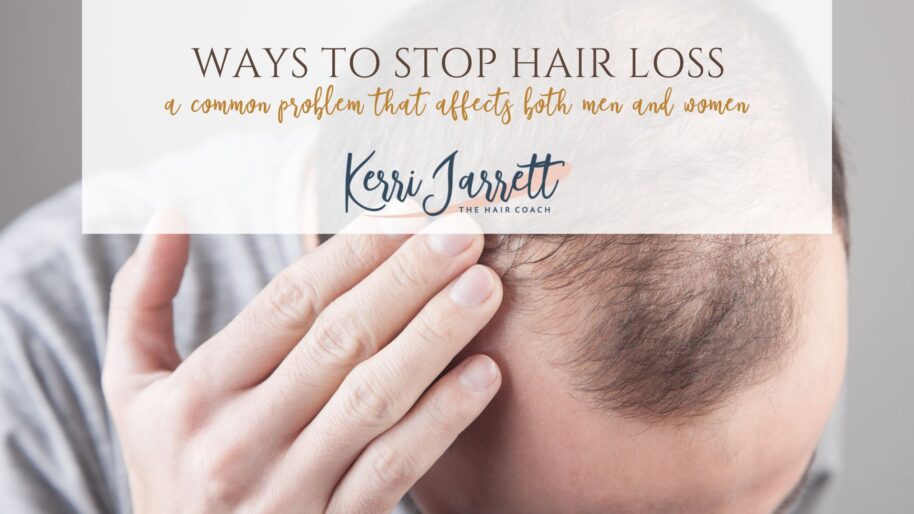Hair loss is a common problem that affects both men and women of all ages. There are many causes of hair loss, including genetics, hormonal imbalances, nutritional deficiencies, stress, and medical conditions. If you are experiencing hair loss, it’s important to identify the underlying cause and take steps to address it. In this blog post, we’ll discuss ways to stop hair loss and where to start when finding the root problem of your hair loss.
Ways to Stop Hair Loss:
- Minoxidil: This is a topical treatment that can help stimulate hair growth. It works by increasing blood flow to the hair follicles, which can promote hair growth.
- Finasteride: This is an oral medication that is used to treat male pattern baldness. It works by blocking the hormone responsible for hair loss.
- Hair Transplant: Hair transplant is a surgical procedure that involves taking hair from a donor area and transplanting it to the balding area.
- Scalp Micropigmentation: This is a non-surgical hair restoration technique that involves tattooing the scalp to give the appearance of a full head of hair.
- Hair Fiber Sprays: These are cosmetic products that can help conceal hair loss by attaching to existing hair fibers, making the hair appear fuller.
Finding the Root Problem of Your Hair Loss:
- Consult a Doctor: The first step in addressing hair loss is to consult a doctor. They can perform tests to determine the underlying cause of hair loss and recommend the appropriate treatment.
- Consult a Trichologist or a Dermatologist who specialize in hair: Consulting a trichologist or a dermatologist who specializes in hair can be beneficial for individuals experiencing hair and scalp problems. These professionals have specialized training and knowledge in the diagnosis and treatment of hair and scalp conditions, making them well-equipped to address a wide range of issues.
- Check Your Diet: Nutritional deficiencies can cause hair loss, so it’s important to consume a healthy, balanced diet. Foods rich in protein, iron, and vitamins like B12 and D can promote healthy hair growth.
- Manage Stress: Stress can cause hair loss, so it’s important to manage stress levels. Meditation, exercise, and mindfulness practices can help reduce stress.
- Hormonal Imbalances: Hormonal imbalances can cause hair loss. If you suspect this is the case, consult with a doctor to determine if hormonal therapy is necessary.
- Medical Conditions: Certain medical conditions like thyroid disease, alopecia, and scalp infections can cause hair loss. Consulting with a doctor can help identify the problem and the best course of action.
In conclusion, hair loss can be a frustrating experience for many individuals. However, there are various treatments available to address hair loss and promote healthy hair growth. It’s important to identify the underlying cause of hair loss and take the necessary steps to address it. By consulting with a doctor and making lifestyle changes, such as consuming a healthy diet and managing stress levels, individuals can take control of their hair loss and achieve healthier, fuller hair.
Benefits of Seeing a Trichologists
A trichologist is a healthcare professional who specializes in the study of hair and scalp disorders. Visiting a trichologist can be beneficial for individuals who are experiencing hair and scalp problems such as hair loss, dandruff, or psoriasis. Trichologists are trained to identify the underlying cause of hair and scalp issues and develop personalized treatment plans to address these problems. They can provide a comprehensive assessment of the hair and scalp, including the use of specialized equipment to examine hair follicles and diagnose conditions. Additionally, trichologists can offer advice on lifestyle changes, diet, and hair care practices that can promote healthy hair growth and prevent future hair and scalp issues. Overall, seeing a trichologist can provide individuals with the knowledge and resources necessary to improve their hair and scalp health and prevent further damage.
What is The Difference Between a Dermatologist and a Trichologist?
Dermatologists and trichologists are both healthcare professionals who specialize in the care and treatment of skin, hair, and scalp. However, there are some differences between the two professions.
Dermatologists are medical doctors who specialize in the diagnosis and treatment of skin, hair, and nail conditions. They have completed medical school and a residency in dermatology, which allows them to diagnose and treat a wide range of conditions related to the skin, hair, and nails. They can prescribe medications, perform surgical procedures, and provide a range of other treatments to address skin, hair, and nail problems.
Trichologists, on the other hand, are healthcare professionals who specialize in the study of hair and scalp disorders. They are not medical doctors, but they have completed specialized training in hair and scalp health, including the diagnosis and treatment of conditions such as hair loss, dandruff, and scalp infections. They can provide non-medical treatments and advice on lifestyle changes, hair care practices, and dietary modifications to promote healthy hair and scalp.
Dermatologists are medical doctors who specialize in the diagnosis and treatment of skin, hair, and nail conditions, while trichologists specialize in the study of hair and scalp disorders and provide non-medical treatments and advice. Depending on the specific hair or scalp problem, both professionals can work together to provide the best possible care and treatment for the patient.


